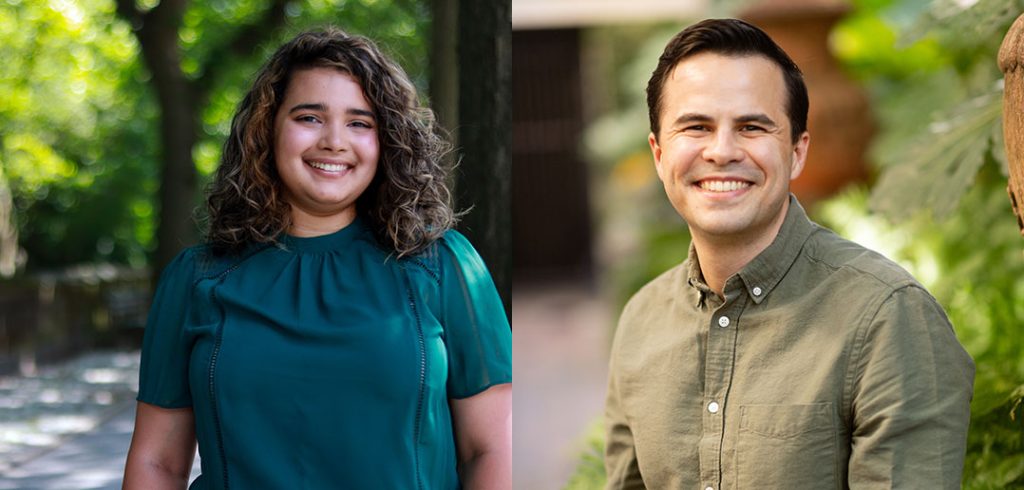Jake Shore, FCRH ’18, and Sarah Huffman, FCRH ’21, were two of about 300 journalists placed in local newsrooms across the country this year by the program, which focuses on “significant beats” that include health care, climate, and education. The corps members also receive training to help them become better journalists and volunteer their time working with middle and high school students on media literacy and journalism projects.
Beth Knobel, Ph.D., associate professor at Fordham, graduate director for the University’s public media master’s program, and adviser to The Fordham Ram, worked with both of them during their time as undergrads. She said she was proud to see them go on to fill the needs of local newsrooms.
Journalism as Public Service
“It’s thrilling to see our students walking the walk of approaching journalism as a public service,” she said. “Jake and Sarah are both incredibly talented young journalists, and they could have done a lot of things with their time other than go and work for a local news organization, but they understand that America needs a strong local press, and they’re both making that happen.”
Shore, who is originally from California and previously worked at The Island Packet in South Carolina, was placed through Report for America at The Current, a nonprofit news outlet that provides watchdog journalism in Savannah and coastal communities in Georgia. He currently covers criminal justice issues for the news organization.
“They do investigative coverage—they don’t do daily stories,” he said. “They’re seeking to redefine the relationship between news outlets and the communities that they cover.”
Shore said that he loves the opportunity to “do important accountability work” while also “living in the community that I cover. That’s something that’s super important to me.”
He talked about a recent piece of his that dug deeper into the history of a police officer in Savannah who shot a Black man and was placed on administrative leave with pay.
“We decided to look into his past as a prison guard at the local prison here, and we found that he had had a bunch of use-of-force reports against him, and a few investigations and suggestions for additional training,” Shore said. “Then he gets hired by this police department that’s very short on officers, and so it raises a lot of questions for people. And those are questions that might not have been asked if we weren’t asking them.”
Huffman, who is originally from New Jersey and interned and freelanced for Norwood News in the Bronx, is working for Technical.ly in Philadelphia, covering the rapidly changing economics of the city, particularly in the business and tech industries.
“My beat focuses on equity and access in Philadelphia, which are not things I had previous experience in, so we’re learning on the job,” she said.
Fordham’s Influence
Both said that their experiences at Fordham helped them find success in these new positions. Shore said that working at WFUV with the former news director George Bodarky, FCRH ’93, who is now the community partnerships and training editor at WNYC, helped him learn how to be a journalist.
“WFUV, it threw me into the deep end of journalism,” he said. “I learned how to do the basic stuff, and then George was like, ‘Okay, go cover this city council press conference. You’ve got to be there in an hour.’ So I had to go there, and get all the facts, and just learn the hard way how to do everything, and it was just so cool.”
Huffman and Shore both credited their work on The Fordham Ram with helping to develop their reporting skills. Huffman worked her way up from United Student Government columnist to assistant news editor at the paper.
“It gave me a lot of hands-on experience with journalism,” she said. “Having to do journalism day-to-day and be on a time crunch, it was really a great experience, and I had a whole portfolio.”
She expressed gratitude to Knobel for helping her become a part of the program.
“She’s wonderful—she wrote one of my recommendations for Report for America and she’s just been so supportive of this whole process,” Huffman said. “I wouldn’t be here without her.”
Community Involvement
Huffman and Shore said that they value the connections to the community that both Fordham and Report for America tried to emphasize.
“Fordham tries to get involved with the community—it’s the same way with Report for America,” she said. “You get involved with the community and really integrate yourself and get to know the people—what they want and need.”
One way Report for America does that is through a required service project, Huffman said, which for her involves teaching journalism to middle and high school students.
“The service project aspect really spoke to me,” Huffman said.
Shore said that he appreciates getting to live in the community that he’s covering, noting that some of the best stories can be found “just driving down the street.”
“I can see the changes that I’m writing about, and I’m talking to people who live there,” he said. “I’m just as much of a community stakeholder as the person at the community meeting who’s a pastor or who owns a local business. We all have to live here together and we all want to make it a better place, and that’s something I really value.”
Knobel said that this desire to be a part of the community and work to improve it is typical for Fordham students, particularly journalism students.
“We stress from literally the first course that people take that journalism is a public service, and that it does, when done right, make the world a better place by shining a light on injustice and by spreading facts—verified, true facts,” she said. “Our hope is that our journalism students will go off and use journalism to tell compelling stories that make lives better.”

